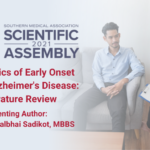Abstract | November 8, 2021
The Genetics of Early Onset Familial Alzheimer’s Disease: A Literature Review
Learning Objectives
- Describe the different gene defects associated with EOFAD (Early Onset Familial Alzheimer's Disease).
- Identify possible pathways in which mutations exert their effect, and potentially use this knowledge for clinical identification of patients.
Introduction: Alzheimer’s Disease (AD) is a chronic neurodegenerative disorder leading to various cognitive and psychiatric symptoms, associated with cerebral cortical atrophy, beta-amyloid plaque formation, and intraneuronal neurofibrillary tangles. It is the most common cause of dementia worldwide. Early-Onset Familial Alzheimer’s Disease (EOFAD) is a subtype of AD with the onset of symptoms consistently occurring before 65 years, with usually more than one generation of a family being affected, with an autosomal dominant mode of inheritance. Usually mutations in the PSEN1, PSEN2, or APP genes are responsible for EOFAD diseases, however many cases have no identified genetic cause due to lack of testing.
Aims: The aim of the study is to summarize the various genes identified to be responsible for EOFAD. By providing a review of published studies of EOFAD, we can highlight the need for proper genetic testing and establish a base for further studies to build upon.
Methodology: A literature search was conducted via the PubMed and Google Scholar indexes. Studies which mentioned cases of EOFAD along with the genes identified to be responsible confirmed via genetic testing were included in the review.
Results: 20 publications were analyzed to identify the genetics and mechanism of EOFAD. In majority of cases, mutations in the PSEN1, PSEN2, and APP were found to be responsible for causing the disease. However, many genetically unexplained cases remain, caused by possible mutations in the TYROPB, NOTCH3, and SORL1 genes.
Conclusions: The majority of EOFAD cases are caused by variants in the PSEN1, PSEN2, and APP genes, however regular genetic testing can help in identification of further causes of the disease, with the further goal of assisting in proper counselling, management, and prevention.

